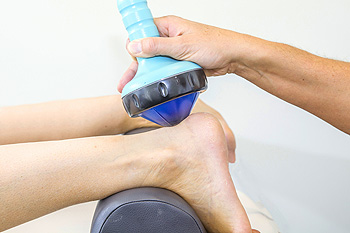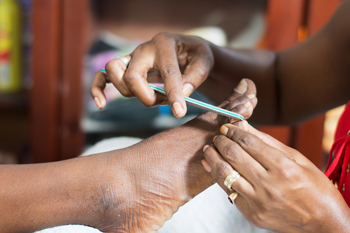





 Improper shoe fitting can lead to many problems such as bunions, corns, and hammertoe. ill-fitting shoes can also lead to muscular imbalances in the body, which can eventually lead to hip and knee injuries. A perfectly fitting shoe should not have any excess material that may interfere with the foot’s natural motion. Many runners tend to wear shoes that are too small for their feet. If you are looking to purchase a new pair of shoes, be aware of the fact that your foot is at its widest at the toes, even though many shoes are not. You should also be mindful of the fact that your foot will spread up to half an inch in length when you are running. If you are experiencing problems with your feet due to poorly fitting shoes, you may want to schedule an appointment with your podiatrist.
Improper shoe fitting can lead to many problems such as bunions, corns, and hammertoe. ill-fitting shoes can also lead to muscular imbalances in the body, which can eventually lead to hip and knee injuries. A perfectly fitting shoe should not have any excess material that may interfere with the foot’s natural motion. Many runners tend to wear shoes that are too small for their feet. If you are looking to purchase a new pair of shoes, be aware of the fact that your foot is at its widest at the toes, even though many shoes are not. You should also be mindful of the fact that your foot will spread up to half an inch in length when you are running. If you are experiencing problems with your feet due to poorly fitting shoes, you may want to schedule an appointment with your podiatrist.
Finding a properly-fitting shoe is important in reducing injuries and preventing foot problems. For more information about treatment, contact one of our podiatrists from Active Foot and Ankle Care, LLC. Our doctors will treat your foot and ankle needs.
Proper Shoe Fitting
A common concern when it comes to foot health, having properly fitted shoes can help prevent injuries to the foot. Out feet affect our posture and gait, which in turn affects the biomechanics and overall bodily structure. With 33 joints, 26 bones, and over 100 ligaments, the potential for serious injury is much greater than one realizes. Although the feet cease growth in adulthood, they still change shape as they mature. Here are some factors to consider when it comes to investing in proper fitting shoes:
Keeping in mind how shoes fit the biomechanics of your body, properly-fitting shoes are vitally important. Fortunately, it is not difficult to acquire footwear that fits correctly. Be sure to wear shoes that support the overall structure of your body. Do your feet a favor and invest in several pairs of well-fitted shoes today.
If you have any questions please feel free to contact our offices located in Fair Lawn, Riverdale, and Englewood, NJ . We offer the newest diagnostic and treatment technologies for all your foot and ankle needs.
 There is a technique that is referred to as extracorporeal shock wave therapy, which is also known as ESWT, that may aid in treating certain foot conditions such as plantar fasciitis. There are two types of shock wave treatments that may be used, and these are referred to as low-energy and high-energy treatments. Low-energy treatments are typically administered over a period of time and may produce mild discomfort. The opposite may be true of the latter, and is often performed in a single treatment, which may often require general anesthesia. The purpose of these treatments is to promote healing of the tissues and surrounding areas affected by the foot condition. Recent research has shown little effectiveness of these treatments and many patients may still have pain after treatment. It’s important to speak with a podiatrist if you would like additional information about shockwave therapy.
There is a technique that is referred to as extracorporeal shock wave therapy, which is also known as ESWT, that may aid in treating certain foot conditions such as plantar fasciitis. There are two types of shock wave treatments that may be used, and these are referred to as low-energy and high-energy treatments. Low-energy treatments are typically administered over a period of time and may produce mild discomfort. The opposite may be true of the latter, and is often performed in a single treatment, which may often require general anesthesia. The purpose of these treatments is to promote healing of the tissues and surrounding areas affected by the foot condition. Recent research has shown little effectiveness of these treatments and many patients may still have pain after treatment. It’s important to speak with a podiatrist if you would like additional information about shockwave therapy.
Shockwave therapy is a treatment commonly used to treat various injuries and conditions, particularly plantar fasciitis in the feet. To learn more, consult with one of our podiatrists from Active Foot and Ankle Care, LLC. Our doctors can provide the care you need to keep you pain-free and on your feet.
Shockwave Therapy
Shockwave therapy is a new treatment option designed to treat bone conditions such as tennis elbow, shoulder pain, and others. Shockwave therapy uses high intensity sound waves that are directed to the affected tissues of the body with pinpoint accuracy. The effects are very beneficial, leading to a production of collagen fibers, eliminating inflammation.
Who Benefits from Shockwave?
Shockwave is recommended for patients suffering from heel pain and associated problems. Heel pain is a common condition which can be caused by obesity, overexertion, and spending a substantial amount of time on hard floors with your feet exposed and unsupported.
Fast and Easy
The therapy is actually a simple process that can leave patients feeling better the very next day. Shockwave therapy is not as dramatic as it sounds. It enables more blood flow to effected areas, addressing the source of the problem and allowing treatment to last for a long time.
Treatment & Recovery Time
Shockwave treatment will enable your feet to recover quickly. This is especially important since surgery is not required. It is cost effective and does not require the use of anesthesia. This treatment is a better option to surgery, since it is proven safe.
If you have any questions, please feel free to contact our offices located in Fair Lawn, Riverdale, and Englewood, NJ . We offer the newest diagnostic and treatment technologies for all your foot and ankle needs.
 An ingrown toenail is a painful and uncomfortable foot condition that is a result of the toenail growing into the skin. If left untreated it may produce serious complications, and this may be especially true of diabetic patients. There may be several causes of this condition occurring, including trimming the toenails improperly, inherited genetic traits, and wearing shoes and socks that do not fit correctly. For some people, if they have incurred an injury such as stubbing or jamming their toe, they may observe that an ingrown toenail may begin to develop. There are noticeable symptoms that typically occur with this ailment, including the skin surrounding the toe appearing red, pain and discomfort that is experienced when pressure is applied to the toe, in addition to pus or blood oozing from the toe. If you feel you have developed an ingrown toenail, it’s advised to consult with a podiatrist, who can perform any treatment options that is recommended for you.
An ingrown toenail is a painful and uncomfortable foot condition that is a result of the toenail growing into the skin. If left untreated it may produce serious complications, and this may be especially true of diabetic patients. There may be several causes of this condition occurring, including trimming the toenails improperly, inherited genetic traits, and wearing shoes and socks that do not fit correctly. For some people, if they have incurred an injury such as stubbing or jamming their toe, they may observe that an ingrown toenail may begin to develop. There are noticeable symptoms that typically occur with this ailment, including the skin surrounding the toe appearing red, pain and discomfort that is experienced when pressure is applied to the toe, in addition to pus or blood oozing from the toe. If you feel you have developed an ingrown toenail, it’s advised to consult with a podiatrist, who can perform any treatment options that is recommended for you.
Ingrown toenails may initially present themselves as a minor discomfort, but they may progress into an infection in the skin without proper treatment. For more information about ingrown toenails, contact one of our podiatrists of Active Foot and Ankle Care, LLC. Our doctors can provide the care you need to keep you pain-free and on your feet.
Ingrown Toenails
Ingrown toenails are caused when the corner or side of a toenail grows into the soft flesh surrounding it. They often result in redness, swelling, pain, and in some cases, infection. This condition typically affects the big toe and may recur if it is not treated properly.
Causes
You are more likely to develop an ingrown toenail if you are obese, have diabetes, arthritis, or have any fungal infection in your nails. Additionally, people who have foot or toe deformities are at a higher risk of developing an ingrown toenail.
Symptoms
Some symptoms of ingrown toenails are redness, swelling, and pain. In rare cases, there may be a yellowish drainage coming from the nail.
Treatment
Ignoring an ingrown toenail can have serious complications. Infections of the nail border can progress to a deeper soft-tissue infection, which can then turn into a bone infection. You should always speak with your podiatrist if you suspect you have an ingrown toenail, especially if you have diabetes or poor circulation.
If you have any questions, please feel free to contact our offices located in Fair Lawn, Riverdale, and Englewood, NJ . We offer the newest diagnostic and treatment technologies for all your foot care needs.
Read more about Ingrown Toenails If your feet or toes endure excess pressure and friction, you may develop what is known as a corn. It is typically a small and hardened area of skin that will often cause discomfort and pain while wearing shoes. General causes for this condition to occur may originate from wearing shoes that are too small, or from walking for extended periods of time. Once the corns are treated, there may be several ways to prevent this uncomfortable condition from occurring again. These may include wearing shoes and socks that fit properly and by trimming the toenails correctly and frequently. Research has shown that our feet may become larger as the aging process occurs, and it’s important to regularly measure our feet, which can aid in determining the correct shoe size. If you have corns and your daily activities are affected, please schedule a consultation with a podiatrist for treatment options that are right for you.
If your feet or toes endure excess pressure and friction, you may develop what is known as a corn. It is typically a small and hardened area of skin that will often cause discomfort and pain while wearing shoes. General causes for this condition to occur may originate from wearing shoes that are too small, or from walking for extended periods of time. Once the corns are treated, there may be several ways to prevent this uncomfortable condition from occurring again. These may include wearing shoes and socks that fit properly and by trimming the toenails correctly and frequently. Research has shown that our feet may become larger as the aging process occurs, and it’s important to regularly measure our feet, which can aid in determining the correct shoe size. If you have corns and your daily activities are affected, please schedule a consultation with a podiatrist for treatment options that are right for you.
Corns can make walking very painful and should be treated immediately. If you have questions regarding your feet and ankles, contact one of our podiatrists of Active Foot and Ankle Care, LLC. Our doctors will treat your foot and ankle needs.
Corns: What Are They? And How Do You Get Rid of Them?
Corns are thickened areas on the skin that can become painful. They are caused by excessive pressure and friction on the skin. Corns press into the deeper layers of the skin and are usually round in shape.
Ways to Prevent Corns
There are many ways to get rid of painful corns such as:
Treating Corns
Although most corns slowly disappear when the friction or pressure stops, this isn’t always the case. Consult with your podiatrist to determine the best treatment option for your case of corns.
If you have any questions please feel free to contact our offices located in Fair Lawn, Riverdale, and Englewood, NJ . We offer the newest diagnostic and treatment technologies for all your foot and ankle needs.
Read more about Understanding Corns and Calluses





